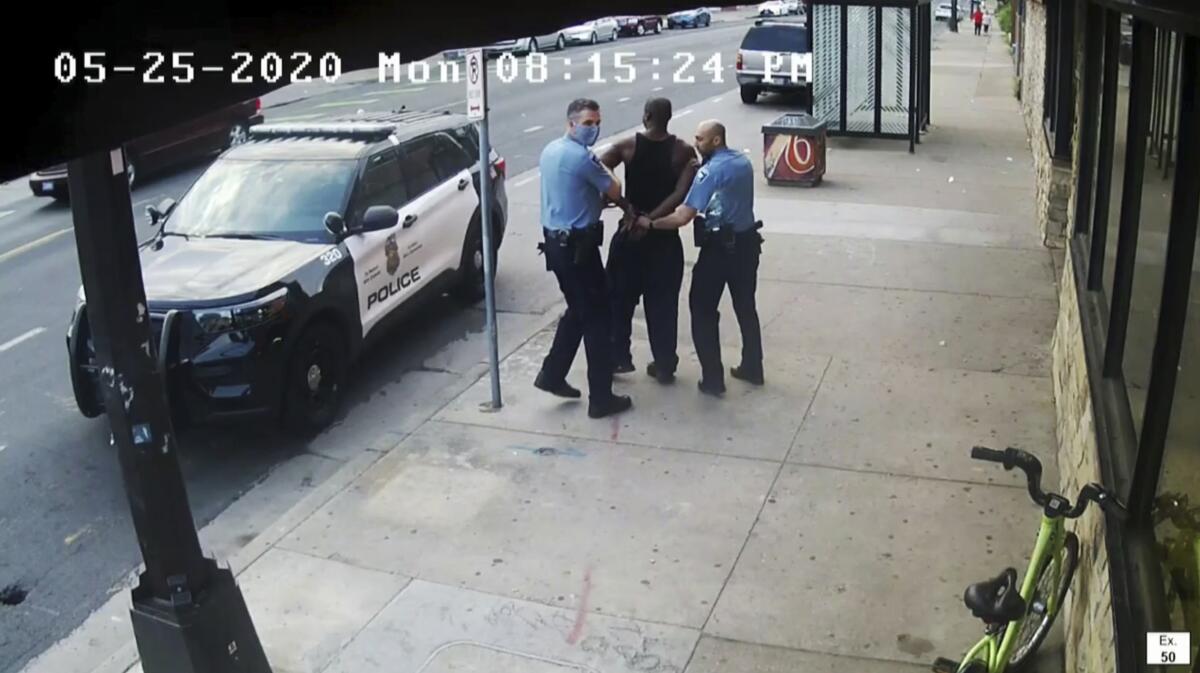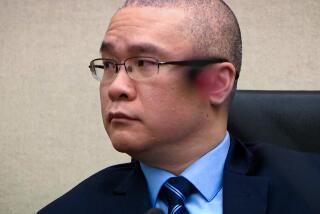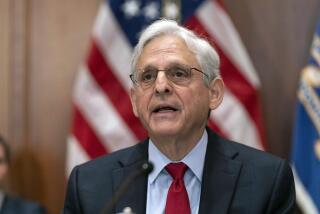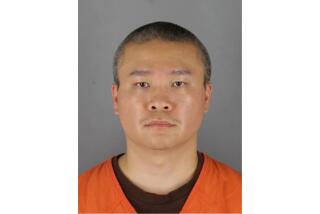Three former cops in George Floyd killing ‘chose to do nothing,’ prosecutor says

- Share via
ST. PAUL, Minn. — Three former Minneapolis police officers charged with violating George Floyd’s civil rights “chose to do nothing” as a fellow officer squeezed the life out of Floyd, a prosecutor said in her closing argument Tuesday. Defense attorneys countered that the officers were too inexperienced, weren’t trained properly and did not willfully violate Floyd’s rights.
J. Alexander Kueng, Thomas Lane and Tou Thao are charged with depriving Floyd of his right to medical care when then-Officer Derek Chauvin pressed his knee into Floyd’s neck for nine and a half minutes as the 46-year-old Black man pleaded for air and eventually went silent.
Kueng and Thao are also charged with failing to intervene to stop Chauvin during the May 25, 2020, killing, which was captured on a bystander video that triggered protests worldwide and a national reexamination of racism and policing.
Prosecutors sought to show during the monthlong trial that the officers violated their training, in part by failing to roll Floyd onto his side or give him CPR. Prosecutors say Floyd’s condition was so serious that even bystanders without basic medical training could see he needed help. But the defense said the Minneapolis Police Department’s training was inadequate and that the officers deferred to Chauvin as the senior officer at the scene.
Thao watched bystanders and traffic as the other officers held down Floyd. Kueng knelt on Floyd’s back and Lane held his legs. All three officers testified.
During her closing argument, prosecutor Manda Sertich singled out each former officer.
She said Thao stared directly at Chauvin and ignored bystanders’ pleas to help a man who was dying “right before their eyes.”
Kueng casually picked gravel from a police SUV’s tire, she said, as Chauvin “mocked George Floyd’s pleas by saying it took a heck of a lot of oxygen to keep talking.”
And although Lane voiced concerns that showed he knew Floyd was in distress, he “did nothing to give Mr. Floyd the medical aid he knew Mr. Floyd so desperately needed,” the prosecutor said.
But attorneys for rookies Lane and Kueng urged jurors to question why their clients were charged at all.
Lane’s attorney, Earl Gray, said his client was “very concerned” about Floyd and suggested rolling Floyd on his side so he could breathe, but was rebuffed twice by Chauvin. Gray noted that Lane tried to help revive Floyd after the ambulance arrived, telling jurors that “any reasonable person should just be disgusted, should be infuriated” that Lane was charged.
Kueng’s attorney, Thomas Plunkett, said that police weren’t adequately trained in the duty to intervene, and that Chauvin was in charge. He also said Kueng looked up to Chauvin, his former field training officer, and “relied on this person’s experience.”
“I’m not trying to say he wasn’t trained,” Plunkett said of Kueng. “I’m saying the training was inadequate to help him see, perceive and understand what was happening here.”
He told jurors to “apply the law to the facts” and to be “the exact opposite of a mob.”
Thao and Chauvin went to the scene to help Kueng and Lane, who were responding to a call that Floyd had used a counterfeit $20 bill at a corner store. Floyd struggled with officers as they tried to put him in a police SUV.
Thao’s attorney, Robert Paule, said his client thought the officers were doing what they believed was best for Floyd — holding him until paramedics arrived.
The charges assert that the officers “willfully” deprived Floyd of his constitutional rights. That means jurors must find that officers acted “with a bad purpose or improper motive to disobey or disregard the law,” Paule said.
He noted that Thao increased the urgency of an ambulance call for Floyd, something he said was clearly “not for a bad purpose.” He also said that Thao reasonably believed Floyd was on drugs and needed to be restrained until medical assistance arrived.
But on the charge of failing to intervene, Sertich said, prosecutors merely had to prove that the officers knew Chauvin was using unreasonable force and knew they had a duty to stop it but didn’t. On the charge that Floyd was denied medical care, the fact that the officers knew Floyd was in distress but did nothing is proof of willfulness, she said.
She pointed to the two and a half “precious minutes” after Floyd became unresponsive and before paramedics got there.
“They chose to do nothing, and their choice resulted in Mr. Floyd’s death,” she said.
Sertich contrasted the officers’ inaction with the desperate cries of bystanders pleading with them to get off Floyd and to check for a pulse: “Even though they had no power, no authority, no obligation, they knew they had to do something.”
Those bystanders, Sertich said, gave Thao and Kueng “play-by-play commentary” that should have raised their awareness that Floyd was in trouble — shouting that Floyd could not breathe and that he wasn’t responsive, and urging the officers to look at him.
Jurors were expected to begin deliberations Wednesday after the judge gives them instructions.
At the start of the trial, U.S. District Judge Paul Magnuson selected 18 jurors, including six alternates. Fourteen remain: 12 who will deliberate and two alternates.
A jury that now appears to be all white will consider the case after a juror who appeared to be of Asian descent was dismissed Tuesday morning without explanation. The court did not release demographic information on the jurors other than the counties they live in.
Chauvin pleaded guilty in the federal case in December, months after he was convicted of state murder and manslaughter charges.
Lane, who is white; Kueng, who is Black; and Thao, who is Hmong American, face a separate trial in June on state charges alleging that they aided and abetted murder and manslaughter.
Their federal trial is wrapping up just as another major civil rights trial in Georgia resulted in the conviction of three white men on hate crimes charges in the death of Ahmaud Arbery, a 25-year-old Black man who was chased and shot to death in February 2020.
More to Read
Sign up for Essential California
The most important California stories and recommendations in your inbox every morning.
You may occasionally receive promotional content from the Los Angeles Times.










